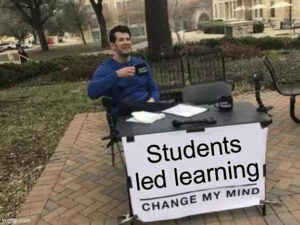No? why? That was my first reaction when reading this fourth statement. What is wrong with “facilitation”?
When I started checking this point of the Manifesto I quickly linked it with an old debate and discussions I had my last year in uni when I heard about Sugata Mitra and his project of The Hole in the Wall. He has been trying to prove why teachers are necessary in the learning process, and if they can actually be replaced, or eliminated. I have to say, that Sugata Mitra doesn’t focus his studies on high education, actually that project for example is with children. And this is very relevant when reading the Manifesto.
While I was reading the manifesto I went to re-watch an old tedTalk of Sugata Mitra about the child-driven education concept. Actually child led learning process is something I am being very obsessed lately. This is something always had my attention, but now as a mother I am more invested on learning more and I have taken some short online courses to learn more. This is something and I truly believe, that the child should be the protagonist of their learning process and has control of the activity and the adult can adapt their language to gain learning and further the child’s development. (1) I basically think (though) that the adult is a facilitator of the process of learning, but the child/student is in control.
Considering previous thoughts about the process of teaching/learning, I would said:
- Children (and I would say, everyone) learn what they are interested about.
- If a teacher can be replaced by a machine, then they must be replaced. (Note: this is considering the theories and studies of Mitra)
- Learning happens when there is interest.
- If information is on the Internet, why do I want it in my head? (Do we understand learning as a process to get knowledge or to get skills and abilities, both?)
- Motivation, encourage, support and love as the fundamental elements of the learning process.
- We can learn by ourselves, but the information is retained when we discuss and interact with other people. We need others, but do we need that those others are experts (meaning teachers)?
Because all of that, my reaction to this 4th statement of the Manifesto, was like:

“The assumption that the individual student is an autonomous learner with a pre-existing, fully developed sense of individual agency and purpose leads to a shift in the perceived role of the teacher, who in ‘learnified’ discourses is often demoted from professional, expert provider to supporter and conduit for the self-determining inividual learner. Learners are assumed to be competent to navigate the complexities of learning in ways which best suit their ‘needs’, and can be best supported by making subject and discipline knowledge-objects available as efficiently as possible.”
What is really wrong with that? and why we believe that being a facilitator is a “demoted” of our profession as teachers? Is this a problem of perception of the language? is this, again a issue of not being English native speaker? I was reading and I asking all this question! why, really why is a problem with learnification (Biesta 2012)?
Actually, I was convinced, I thought that good educator is the one that guides the process of learning, not the one who actually delivers. I believe that teachers are facilitators. They are responsible of creating the environment where the learning process can be developed, respecting the pace and motivations of each student. Can this be done if you are not a good expert on the subject? Because for me, only a good expert can become a good facilitator. I mean, a good teacher that knows a lot, is motivated and cares about the subject is the one that knows how to guide and create the environment where the learning happens.
I want to think that students know how to detect their needs. I still thinking that they are the ones who should take control of their learning process and be responsible with it. They should be “autonomous learner with a pre-existing, fully developed sense of individual agency and purpose leads “, and I think that if we don’t have these kind of students on higher education is because we haven’t allow them to take that responsibility during their previous educational years. Maybe everything has been regulated, and scheduled and students don’t know how to manage their own learning process? Maybe this is another story and it deserves another post, maybe in the future!…
After reading the arguments in the Manifesto and I have changed (a little) my mind. For me still very clear that facilitation role is not a problem on primary education, but is it the same on higher education? I am not that sure any more.Probably the level of expertise is more required when we are talking about higher education. Probably it is essential that the teacher is involved in constant research about the topic and can answer all the question the students have, not only being able to point where to find answers….
I guess for me it is not about using “teacher”, “expert”, “instructional designer” or “facilitator, is going backwards and asking ourselves what is the role of the person who will accompany the students in their learning process. But I agree that as the Manifesto pointed, is really important that the “teacher” role is not des-professionalised. And it is important that the role is not undervalued or perceived as something that is easy to automated or replaced.
“Movements in digital education which emphasise automation, scale and on-demand access often contribute to this de-professionalisation, making the delegation of the ‘teacher function’ to automated systems or an under paid,under-valued academic precariat seem supportable or even inevitable.”



Really good to see you being willing to challenge some of the ideas we are encountering across the course: this is going to serve you so well as the semester unfolds, Lidia.
For me, I see this statement from the Manifesto as a challenge to the dilution of the teacher’s expertise in online settings. I see it as a way of resisting an emphasis on content over craft, where the teacher’s role is to organise content which can then be consumed by a mass audience of students.
We’ll discuss this more in the Teaching and Technology block of the course which is coming up soon – and I think you’ll really enjoy – however is the teacher’s role to nurture or is it about expertise, provocation and curation (or indeed a combination of these and other things)?